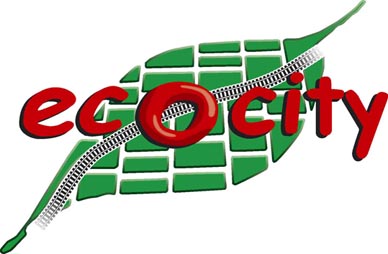Ecocity Project
Title of Project:
Urban Development towards Appropriate Structures for Sustainable Transport

Project summary
Problems to be solved:
Urban growth usually happens in contradictory ways to the concept of sustainable settlement development. Spatially diffused and functionally segregated settlement structures tend to cause growth in traffic volumes as well as increased pressures on the environment. Measures to promote sustainable transport modes in isolation are stultified by these trends, still dominating settlement planning concepts and their implementation.
The resources to be conserved for future generations - land (urban sprawl), energy sources (fossil fuels), the environment, as well as human resources (health, quality of life) - are particularly jeopardised.
In contrast to this trend, the objectives of the European Union for the development of sustainable settlements and for the improvement of urban environments specifically imply to support a polycentric, balanced urban system and to promote resource-efficient settlement patterns, that minimise land-take and urban sprawl.1
The project team intends to contribute to the implementation of these objectives by designing model settlements for specific sites to demonstrate the feasibility and desirability of future urban living compatible with sustainability requirements. The concepts to be developed should provide the basis for urban places to continue being the engine of social, cultural and economic development in the future.
Scientific objectives
To overcome the problems of urban development mentioned, requires the consistent integration and implementation of specific, often already tested individual solutions. Instead of adjusting solutions to structures, this project aims at creating optimal structures, in which optimal solutions can be implemented.
The overall goal of the project is, hence, to develop settlement patterns for sustainable cities (ECOCITIES), emphasising the implications for an environmentally compatible transport system.
Strategies to design a space- and energy saving settlement structure will thus give priority to the requirements of sustainable transport (convenience for pedestrians, efficient public transport and goods' distribution logistics) as well as energy efficiency, environmental quality and the utilisation of alternative sources of energy.
Necessary conditions of sustainability to be operationalised are compactness – selection of suitable sites - and a balanced mix of land uses.
To improve the structures in grown cities will require a very long process confronted with many barriers, e.g. car-minded life styles. Therefore this project aims at creating examples for an ecological sustainable development in new settlements or quarters of towns (sustainable ‘cities of tomorrow’) to shift the existing demand for new buildings from urban sprawl to a sustainable development with less land use and reduced consumption of energy and resources.
A concept for a sustainable model settlement will be developed, in co-operation with the respective local community, for one specific site in each of six participating countries of the project:
- Bad Ischl (Austria)
- Györ (Hungary)
- Tampere (Finland)
- Trnava (Slovakia)
- Tübingen (Germany)
- Umbertide (Italy)
Approach and Consortium
The main steps of the project workplan are to develop a common concept for sustainable urban development, to design model settlements and to derive general guidelines for planning.
According to the integrated approach the consortium of 30 participants from 9 countries is composed multidisciplinary, consisting mainly of institutions active in the fields of urban planning and transport, but also involves experts for energy, socio-economics etc. as well as communities.
Cluster
The project ECOCITY is co-operating with 9 similar projects in the
Cluster LUTR (Land use and Transport Research)
Contact
Co-ordinator: Prof. Dr. Uwe SCHUBERT,
Institute of Economic Geography, Regional Development and Environmental Management, Department of Environmental Economics and Management, University of Economics and Business Administration Vienna
|
Address: |
Abteilung für Wirtschaft und Umwelt |
|
Telephone: Fax: E-mail: |
(0043-1) 313 36-4848 (0043-1) 313 36-709 Uwe.Schubert@wu-wien.ac.at |
1 Sustainable Urban Development in the European Union: A Framework for Action; Communication from the Commission to the Council, the European Parliament, the Economic and Social Committee and the Committee of the Regions, Brussels 1998...........back to the top
Sponsored by the European Commission, DG Research, under the Key Action 4: "City of Tomorrow and Cultural Heritage" of the Thematic Programme "Energy, Environment and Sustainable Development" within the 5th Framework Programme RTD Priority 4.4.1 "Strategic approaches and methodologies in urban planning towards sustainable urban transport"
